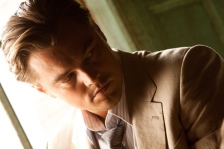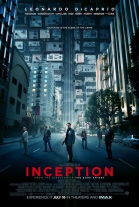Inception
|  Christopher Nolan could very well be the love child of Stanley Kubrick and Alfred Hitchcock. Like those great filmmakers of a previous era, Nolan does his work right in the middle of the big-budget Hollywood mainstream, but with the kind of creative vibrancy, philosophical intensity, and willingness to experiment, subvert, and challenge that makes most studio suits quake in their loafers. He has Kubrick’s rigorous intellectualism--his films display a genuine fascination with both the human condition and our attempts, however flawed, to understand it--and Hitchcock’s precise artistry of suspense and violence, not to mention his love of macguffins. Nolan’s latest film, Inception, which would be the best thing at the multiplex just about any summer, but feels all the more impressive in this particularly staid summer season of hollow remakes, sequels, and spin-offs, is a kind of shining beacon, reminding us that blockbusters don’t have to be soulless cash grabs and that, when great artists are given the resources they need to bring true vision to the screen, the results can be transcendent and entertaining. Christopher Nolan could very well be the love child of Stanley Kubrick and Alfred Hitchcock. Like those great filmmakers of a previous era, Nolan does his work right in the middle of the big-budget Hollywood mainstream, but with the kind of creative vibrancy, philosophical intensity, and willingness to experiment, subvert, and challenge that makes most studio suits quake in their loafers. He has Kubrick’s rigorous intellectualism--his films display a genuine fascination with both the human condition and our attempts, however flawed, to understand it--and Hitchcock’s precise artistry of suspense and violence, not to mention his love of macguffins. Nolan’s latest film, Inception, which would be the best thing at the multiplex just about any summer, but feels all the more impressive in this particularly staid summer season of hollow remakes, sequels, and spin-offs, is a kind of shining beacon, reminding us that blockbusters don’t have to be soulless cash grabs and that, when great artists are given the resources they need to bring true vision to the screen, the results can be transcendent and entertaining.It is not surprising that Nolan has made a film almost entirely about and within dreams, since all of his previous films have played with the concept of self-delusion, and what are dreams but visualized self-delusions? In his breakthrough Memento (2000), he gave us a protagonist with anterograde amnesia who was hunting his wife’s killer, but the film was really about the impossibly slippery nature of “truth,” and he used the amnesia (really just a clever narrative gimmick) as a means of showing how we will delude ourselves into infinity if it satisfies us emotionally. Similarly, in his two Batman films, Batman Begins (2005) and The Dark Knight (2008), he gave us a caped hero of dense psychological complexity who ultimately meets his match in an inexplicable psychopath who represents everything that is out of our control; the idea of heroism itself as delusion. These, along with Insomnia (2003) and The Prestige (2006), all hinge on the fleeting illusion of control, as Nolan’s protagonists grasp wildly at controlling their fates, but ultimately discover it is outside of their grasp. In Inception, teams of trained professionals are able to break into people’s subconscious and steal their secrets. This is done by a carefully planned process not unlike a bank heist, and is facilitated by a technological gizmo originally designed by the military. The exact physical and psychological mechanics of it don’t really matter--that’s the macguffin in the machine--but the ideas, which are what really fascinate Nolan, do. Thus, Inception is not so much about dreams as it is about the scary-exciting idea that our brains work without us, that our subconscious is constantly firing away without our having any idea what it’s doing, which is just another variation of Nolan’s insistent focus on the illusion of control. The psychological espionage in Inception is just one more variation on characters seeking to impose order on a disordered world, as are the attempts by the tormented main character, Dom Cobb (Leonardo DiCaprio), to use his dreams and his skills within them to keep alive the memory of his dead wife Mal (Marion Cotillard) and make right what went terrible wrong. Dom is another inflection of Guy Pearce’s Leonard from Memento, who tracked his wife’s killer not because finding him would bring him peace, but because the pursuit gave him meaning. Thus Dom inflicts on himself a tragic, masochistic replay night after night of events in his past over which he had no control and has even less in their illusory replay. Dom and a team of experts he has assembled, which include a manager to keep everything organized (Joseph Gordon-Levitt), a young architect to design the world of the dream (Ellen Page), a chemist to develop special sedatives (Dileep Rao), and a “forger” who can impersonate others within the dream (Tom Hardy), are charged by Saito (Ken Watanabe), the CEO of a Japanese energy conglomerate from whom they earlier failed to steal secrets, to break into the subconscious of Robert Fischer, Jr. (Cillian Murphy), the son of the CEO of an even larger energy conglomerate and heir to that throne, which could soon dominate half the world’s energy production. The trick, though, is that Saito doesn’t want Dom to steal anything from Robert’s mind; rather, he wants them to plant an idea--the desire to break up his father’s empire once he inherits it--that, upon waking, will think is his own. This involves an incredibly complex set-up in which Robert must be isolated, drugged, and then hooked up to Dom and his crew so that they may all share the same dream, which is technically Dom’s but has been “designed” by Page’s architect. As it turns out, the plan involves not just one dream, but dreams within dreams, which take the characters deeper and deeper into Dom’s subconscious. And, while the film quickly dispenses with the age-old idea that if you die in your dream you die in real life (rather, here you just wake up), there are dangers throughout, including all the anonymous bystanders in the dream, which are actually subconscious projections that will act like an immune system if they suspect that there is an intruder (hence Dom and the others are not able to manipulate the dream world against its own logic, or at least not without attracting attention to themselves as subconscious interlopers). Worst of all, though, is the presence of Dom’s subconscious projection of Mal, who is a manifestation of all of his guilt and sadness and remorse and therefore breaks through as an agent of chaos, constantly threatening to upend their work. Nearly half of the film is taken up with the plan to plant the idea in Robert’s mind, which involves the characters interacting on no less than five different levels of existence (one in “reality” and four dreams-within-dreams), all of which have their own temporal dimensions. This extended action sequence, which involves plots within plots and dreams within dreams, takes cross-cutting to an entirely new level and is very close to exhausting in its execution; there is always the danger of becoming lost in the maze, Nolan and his editor Lee Smith keep us oriented even when we’re lost. More so than just about any Hollywood director, Nolan has an intuitive sense of how to string out his complex narrative mechanics, parceling out just enough information to keep us connected, but always wanting more. There are some temporal gymnastics in the film (like The Prestige, it actually begins near the end so that the opening moments don’t take on real meaning until we’re more than two hours into the story), but Nolan’s screenplay (the first he has conceived and written solo without his brother Jonathan) relies more on gradual revelations of Dom’s backstory, which has enough torment and regret to justify some of his more ethically compromised decisions (such as not telling his team crucial information that greatly affects their safety within Robert’s dream). DiCaprio essentially plays the same character he played in Martin Scorsese’s Shutter Island earlier this year, but he does this bit of haunted protagonist so well that it feels like a welcome encore, rather than a retread. His obsessive desire to “go home” at any cost (which has an interesting echo of The Wizard of Oz to it, perhaps the ultimate “dream movie”) propels him and us into the vortex, and the fact that we are never sure what to expect is only part of the film’s grand achievement. Of course, the plot description above does not even begin to do justice to the complexity of Nolan’s scenario, which, like the Batman films, he imbues with a sense of logic and realism that makes the patently ridiculous seems utterly reasonable. He and cinematographer Wally Pfister (who has shot all of Nolan’s films) take that same approach to the depiction of dreams, as well, which are not painted in the typically cinematic hues of the bizarre and the fantastic, but rather as relatively mundane locations (city streets, hotels, beaches, etc.) that have just a slight edge to them; they are more uncanny than surreal, and in that sense are much closer to our actual dream experiences than cinema’s traditional representations of them. Granted, there are sequences in which Nolan expands the palette and gives us dreamscapes of a much higher “wow” factor, including a sequence in which a city that looks like Paris folds over on itself and an extended sequence in zero-gravity, but otherwise he doesn’t distract us with gimmicky imagery. He doesn’t need it, anyway, as his balance of philosophical ideas and narrative tension are more than enough to keep the film not just engaging, but utterly riveting for its entire duration, right down to the possibly ambiguous final shot, which is but one more reason to get back in line and see it again. Copyright ©2010 James Kendrick Thoughts? E-mail James Kendrick All images copyright © Warner Bros. |
Overall Rating: 


 (4)
(4)


